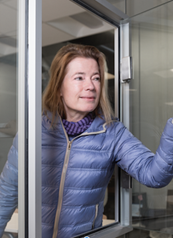Friday, March 11, 2022
2:00pm-3:00pm
*ONLINE*
March 11, 2022
Interested members of the U of T community who would like to attend the online seminars can email Kendra Hunter at hunter@mie.utoronto.ca for the Zoom link.
Professor Philomena Bluyssen – Delft University of Technology

The Need for Understanding the Indoor Environment and its Occupants
Abstract
While most people are aware of the importance of the outdoor environment, especially in relation to climate change but also to problems more directly related to our health, the effects of indoor environmental quality are not that common knowledge. Indoor air quality is an important part of indoor environment, confirmed in the past two years by the pandemic. The other factors, thermal quality, acoustical or sound quality and visual or lighting quality, can also play an important role in how you experience the indoor environment as a whole.
Research has shown that, even though the conditions seem to comply with current standards for indoor environmental quality (IEQ) based on single-dose response relationships, staying indoors is not good for our health. In our current standards, IEQ is still described with quantitative dose-related indicators, expressed in number and/or ranges of numbers for each of the factors (indoor air, lighting, acoustics and thermal aspects). Individual differences in needs and preferences of occupants (over time) are not accounted for. Other stressors and factors, whether of psychological, physiological, personal, social or environmental nature, are rarely considered. Interactions of stressors and effects at and between human and environment level are ignored. The focus is on preventing negative effects: positive effects are usually not considered. There is a need for an new model for assessing IEQ; a model which takes account of the combined effects of positive and negative stress factors in buildings on people (patterns), interactions, as well as the (dynamic) preferences and needs of occupants (profiles) and dynamics of the environment.
Note: Students will be asked to complete the ‘home questionnaire’, a questionnaire developed for students on their health and comfort and indoor environment of their home and study place. If possible, the outcome will be presented, compared to other students, and explained along basic IEQ-information that can be found in the two small highly illustrated booklets ‘All you need to know about indoor air – a simple guide for educating yourself to improve your indoor environment’ and ‘All you need to know about air conditioning – The how and why of heating, ventilating and air conditioning systems in a nutshell’.
Bio
Prof. dr. Philomena M. Bluyssen received her MSc in 1986 at the Technical University of Eindhoven, and in 1990 her PhD at the Technical University of Denmark with a thesis on ‘Air quality evaluated by a trained panel’. After working for more than twenty years as researcher with TNO, where she coordinated among others several European projects on optimisation of Indoor environment quality and energy use, she was appointed full Professor Indoor Environment in 2012 at the Faculty of Architecture and the Built Environment, of the Delft University of Technology in Delft. At the TU Delft she initiated the SenseLab, a semi-lab environment sponsored by 25 companies and organisations, in which she recently performed research on airborne transmission of exhaled aerosols. In 2019 Bluyssen was appointed Visiting Professor at Feng Chia University in Taichung, Taiwan. Bluyssen is fellow of the International Society of Indoor Air Quality and Climate (ISIAQ). She is co-founder of the Dutch ISIAQ chapter and was the first president of ISIAQ.nl. She has contributed and/or authored to more than 275 publications, and has been invited as guest, distinguished or keynote lecturer at several conferences and universities. For ‘The Indoor Environment Handbook: How to make buildings healthy and comfortable’, she received the prestigious Choice Outstanding Academic Titles of 2010 Award.’ Her book ‘The Healthy Indoor Environment – How to assess occupants’ wellbeing in buildings’, was published in 2014 and received the IDEC 2016 Book Award.
https://www.tudelft.nl/en/stories/articles/we-have-to-close-the-knowledge-gap-on-ventilation-now
https://www.delta.tudelft.nl/article/video-senselab-prevent-sick-building-syndrome
MIE’s Distinguished Seminar Series features top international researchers and leading experts across major areas of Mechanical Engineering and Industrial Engineering. The speakers present about their latest research and offer their perspectives on the current state of their field. The seminars are part of the program requirements for MIE Master of Applied Science and PhD students. The Distinguished Seminar Series is coordinated for 2021-2022 by Assistant Professor Merve Bodur.
View all upcoming MIE Distinguished Seminars.
